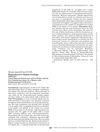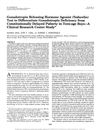 25 citations,
May 2021 in “Journal of exposure science & environmental epidemiology/Journal of exposure science and environmental epidemiology”
25 citations,
May 2021 in “Journal of exposure science & environmental epidemiology/Journal of exposure science and environmental epidemiology” Common Black hair care products may affect hormone levels and potentially impact health, especially in reproductive and metabolic areas.
[object Object] September 2021 in “Journal of advances in medicine and medical research” Low Vitamin D levels are linked to female hair loss.
 33 citations,
January 2017 in “Conservation physiology”
33 citations,
January 2017 in “Conservation physiology” Measuring reproductive hormones in brown bear hair could help identify their sex and reproductive state, but better collection methods or lab techniques are needed.
 12 citations,
March 2017 in “Journal of obstetrics and gynaecology Canada”
12 citations,
March 2017 in “Journal of obstetrics and gynaecology Canada” Testosterone therapy can modestly improve sexual function in menopausal women but should be used cautiously and is not recommended for routine measurement in sexual dysfunction or hirsutism.
1 citations,
October 2023 in “Biology” Fasting in hens affects thyroid hormones, which regulate feather and hair growth.
 6 citations,
December 2015 in “JAMA”
6 citations,
December 2015 in “JAMA” The woman's high testosterone levels indicated PCOS, leading to treatment that improved her symptoms.
 1 citations,
October 2010 in “Cambridge University Press eBooks”
1 citations,
October 2010 in “Cambridge University Press eBooks” The document suggests new ways to assess and diagnose hyperandrogenism to improve accuracy.
 November 2022 in “Journal of the Endocrine Society”
November 2022 in “Journal of the Endocrine Society” Taking biotin can lead to incorrect low results in free testosterone tests.
 18 citations,
May 1992 in “American Journal of Biological Anthropology”
18 citations,
May 1992 in “American Journal of Biological Anthropology” Higher androgen levels do not cause baldness in men.
 30 citations,
January 2019 in “Clinical Endocrinology”
30 citations,
January 2019 in “Clinical Endocrinology” The study concluded that both anti-Mullerian hormone and LH/FSH ratio are higher in women with PCOS and combining these markers with BMI could improve diagnosis accuracy.
 24 citations,
October 1995 in “The Journal of clinical endocrinology and metabolism/Journal of clinical endocrinology & metabolism”
24 citations,
October 1995 in “The Journal of clinical endocrinology and metabolism/Journal of clinical endocrinology & metabolism” The nafarelin test can reliably distinguish between gonadotropin deficiency and delayed puberty in teenage boys.
 10 citations,
October 1992 in “Hormone and Metabolic Research”
10 citations,
October 1992 in “Hormone and Metabolic Research” Finasteride safely lowers DHT levels without affecting hormone levels, helping with conditions like enlarged prostate, acne, and hair loss.
 22 citations,
January 2015 in “The Cochrane library”
22 citations,
January 2015 in “The Cochrane library” DHEA may help with sexual function when used intravaginally by menopausal women but is similar to hormone therapy in other aspects and might cause more side effects like acne and hair loss.
 13 citations,
December 2010 in “Nature Reviews Endocrinology”
13 citations,
December 2010 in “Nature Reviews Endocrinology” A young man with an eating disorder had a life-threatening adrenal crisis due to an autoimmune condition, highlighting the need for better education on managing hormone treatments.
 January 2023 in “Journal of applied animal research”
January 2023 in “Journal of applied animal research” Short photoperiods improve cashmere growth and quality in goats by changing hormone levels and gene expression.
 21 citations,
September 2021 in “Fertility and Sterility”
21 citations,
September 2021 in “Fertility and Sterility” A blood test level of 3.2 ng/mL of Antimüllerian hormone is good for identifying polycystic ovarian morphology in European women aged 25–45.
 14 citations,
December 1998 in “The Journal of Clinical Endocrinology and Metabolism”
14 citations,
December 1998 in “The Journal of Clinical Endocrinology and Metabolism” MENT could be a better option than testosterone for male hormone therapy and birth control because it works well at lower doses and has fewer side effects on the prostate.
[object Object]  13 citations,
August 1997 in “Steroids”
13 citations,
August 1997 in “Steroids” Finasteride effectively lowers specific hormone levels, helping monitor treatment progress.
4 citations,
March 2018 in “Systems biology in reproductive medicine” Men born very underweight had higher estrogen levels but normal reproduction compared to normal birth weight men.
November 2024 in “Psychoneuroendocrinology” Testosterone increases hair testosterone levels, stress raises hair cortisol, and relationship status affects hormone levels.
 30 citations,
August 1992 in “The Journal of Clinical Endocrinology and Metabolism”
30 citations,
August 1992 in “The Journal of Clinical Endocrinology and Metabolism” Finasteride doesn't affect hormone levels in normal men.
 5 citations,
October 2018 in “Journal of Clinical Laboratory Analysis”
5 citations,
October 2018 in “Journal of Clinical Laboratory Analysis” Women with PCOS who have high male hormone levels often also have insulin resistance.
 2 citations,
August 2020 in “JCRPE”
2 citations,
August 2020 in “JCRPE” A girl with Denys-Drash syndrome was misdiagnosed due to biotin affecting her hormone test results.
 38 citations,
January 1997 in “Gynecological Endocrinology”
38 citations,
January 1997 in “Gynecological Endocrinology” Finasteride and flutamide effectively reduce hirsutism in PCOS women, with flutamide also lowering hormone levels.
 48 citations,
July 2009 in “The Journal of Sexual Medicine”
48 citations,
July 2009 in “The Journal of Sexual Medicine” DHEA did not improve sexual function, well-being, or menopausal symptoms in postmenopausal women with low libido but caused side effects like acne and increased facial hair.
 29 citations,
May 1998 in “Bulletin of the American College of Nurse-Midwifery”
29 citations,
May 1998 in “Bulletin of the American College of Nurse-Midwifery” The document concludes that menopause should be seen as a natural part of aging and managed with personalized care and informed choices.
 18 citations,
August 1985 in “European journal of endocrinology”
18 citations,
August 1985 in “European journal of endocrinology” Cyproterone acetate is effective for treating hirsutism, but some patients may feel worse on low-dose maintenance therapy.
 16 citations,
February 2018 in “European Journal of Endocrinology”
16 citations,
February 2018 in “European Journal of Endocrinology” Diagnosing hyperandrogenism in women is complex and requires accurate testing methods and consideration of SHBG levels.
12 citations,
December 2020 in “Comprehensive psychoneuroendocrinology” Hormone levels in hair change during pregnancy, with progesterone increasing significantly compared to non-pregnant women.
 November 2013 in “John Wiley & Sons, Ltd eBooks”
November 2013 in “John Wiley & Sons, Ltd eBooks” The document concludes that accurate diagnosis of male and female gonadal disorders is crucial for effective treatment and better patient outcomes.
























